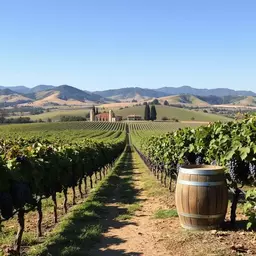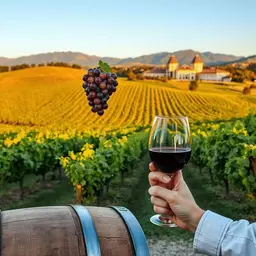Sustainable Winemaking in Napa Valley

Imagine walking through a lush vineyard, where every grape is a testament to the commitment of its growers to protect the environment. Sustainable winemaking in Napa Valley is more than just a trend; it embodies a philosophy that intertwines quality wine production with environmental stewardship and community engagement. By understanding the principles of sustainable practices, you can elevate your wine experience while contributing to a healthier planet.
What You Will Learn
- Sustainable winemaking encompasses practices that protect the land and support local communities, enhancing both wine quality and environmental health.
- Implementing sustainable practices reduces chemical usage, conserves water, and promotes biodiversity, positively impacting the ecosystem.
- Organic and biodynamic farming techniques prioritize soil health and resilience, leading to extraordinary wine flavors and stronger ecosystems.
- Wine tourism significantly contributes to sustainability by promoting eco-friendly wineries and raising awareness about responsible practices.
- Eco-conscious consumers drive the demand for sustainable wines, encouraging wineries to adopt and maintain transparent and responsible practices.
Benefits of Sustainable Practices in Winemaking
Embracing sustainable practices brings multiple benefits, particularly for the environment and local communities:
Environmental Benefits
- Improves air and water quality
- Encourages ecological balance
- Reduces chemical use in vineyards
- Enhances soil health and biodiversity
Community Benefits
- Supports local economies and communities
- Promotes renewable energy sources
- Enhances community engagement and awareness
- Creates a sense of community among winemakers
Key Sustainable Practices
- Organic farming techniques
- Water conservation methods
- Energy efficiency measures
- Responsible land management
Future Trends
- Increased use of renewable energy sources
- Integrating technology for better resource management
- Focus on regenerative agriculture
- Enhancing biodiversity practices
Understanding Sustainable Winemaking in Napa Valley
Napa Valley is not just famous for its stunning landscapes and world-class wines; it's also a leader in sustainable winemaking. As a passionate wine enthusiast, I often marvel at how vineyards in this iconic region are committed to preserving their beautiful environment while crafting exceptional wines. By embracing sustainable practices, winemakers are ensuring that future generations can enjoy the same breathtaking views and delightful flavors that we cherish today.
But what does sustainable winemaking really mean? It’s about developing methods that protect the land, use resources wisely, and support local communities. The ethos of sustainability in Napa Valley goes beyond just organic farming; it’s a holistic approach to winemaking that values the entire ecosystem. Have you ever thought about how your favorite bottle of wine connects to the earth and the people who cultivate it? Understanding this connection can enrich your wine-tasting experience.
When we think about sustainability, it's essential to recognize how it impacts not only the vineyards but also the larger community. Sustainable practices in winemaking help in reducing the carbon footprint, conserving water, and promoting biodiversity. For more insights, check out this Napa Valley Wine Tasting Guide. Each time we raise a glass of wine, we're also raising awareness about our planet's well-being!
The Importance of Sustainable Practices in Winemaking
When we think about sustainability, it's essential to recognize how it impacts not only the vineyards but also the larger community. Sustainable practices in winemaking help in reducing the carbon footprint, conserving water, and promoting biodiversity. Each time we raise a glass of wine, we're also raising awareness about our planet's well-being!
- Reduces chemical use in vineyards
- Enhances soil health and biodiversity
- Promotes renewable energy sources
- Supports local economies and communities
By implementing these practices, Napa Valley winemakers are creating a legacy. This commitment not only benefits the environment but also enhances the overall quality of wine. Isn't it wonderful to think about how every bottle you enjoy contributes to a healthier planet?
Frequently Asked Questions (FAQs)
- What does sustainable winemaking mean?
Sustainable winemaking involves practices that protect the environment, use resources efficiently, and support local communities. It's a holistic approach that values the entire ecosystem. - Why are sustainable practices important in winemaking?
Sustainable practices reduce the carbon footprint, conserve water, promote biodiversity, and enhance the overall quality of wine. - What are some key sustainable practices in Napa Valley?
Key practices include organic farming, water conservation, energy efficiency, and responsible land management. - How do organic and biodynamic farming techniques contribute to sustainable winemaking?
These techniques prioritize soil health, avoid synthetic pesticides and herbicides, and enhance vine health and resilience. - What role does wine tourism play in promoting sustainable practices?
Wine tourism encourages visitors to engage with eco-friendly wineries, fosters a community spirit, and raises awareness about the importance of sustainability. - How do eco-conscious consumers influence sustainable winemaking?
Eco-conscious consumers drive the demand for responsibly made wines by choosing organic and biodynamic options, supporting wineries with transparent practices, and advocating for environmentally friendly products.
Defining Sustainable Winemaking in the Context of Napa Valley
So, how do we define sustainable winemaking specifically in Napa Valley? It encompasses various practices that ensure the health of the vineyards and the surrounding ecosystem. This includes organic farming, water conservation, energy efficiency, and responsible land management. These practices are essential because they tackle the unique challenges posed by climate change while preserving the rich heritage of Napa's vineyards.
In my travels through Napa Valley, I've seen firsthand how winemakers commit to these sustainable practices. They often engage with the community and prioritize transparency in their methods. This approach not only builds trust but also invites wine lovers like us to be part of the journey. What better way to connect with your favorite vineyard than by understanding its dedication to the environment?
Benefits of Sustainable Practices for the Environment and Communities
Embracing sustainable practices brings a multitude of benefits, particularly for the environment and local communities. For starters, these practices help preserve the delicate balance of the ecosystem in Napa Valley. By reducing chemical inputs and promoting biodiversity, winemakers play a vital role in protecting wildlife habitats and natural resources.
- Improves air and water quality
- Encourages ecological balance
- Fosters strong local economies
- Enhances community engagement and awareness
Additionally, sustainable winemaking creates a sense of community. As I walk through the charming vineyards of Napa Valley, I feel the camaraderie among wine producers who share a common goal: to nurture the land while crafting exceptional wines. This collaborative spirit is what makes Napa Valley truly special!
Organic Farming and Biodynamic Wine in Napa Valley
As we delve deeper into sustainable winemaking, it's essential to highlight the role of organic farming and biodynamic practices. These methods prioritize the health of the land and the vines, ensuring that the grapes grown are of the highest quality. Have you ever tasted a wine made from organic grapes? The flavors can be truly extraordinary!
- Utilizes natural fertilizers and compost
- Avoids synthetic pesticides and herbicides
- Enhances vine health and resilience
Many Napa Valley wineries are adopting organic farming techniques, allowing them to produce wines that reflect the terroir in the purest form. This approach not only results in vibrant flavors but also contributes to the overall health of the vineyard ecosystem.
Exploring Organic Farming Techniques and Their Benefits
Organic farming techniques include practices such as cover cropping, crop rotation, and integrated pest management. These methods help maintain soil fertility and promote a healthy vineyard environment. I find it fascinating how each technique contributes to the bigger picture of sustainability in Napa Valley.
Moreover, organic farming often leads to higher biodiversity within the vineyard, which can result in a more balanced ecosystem. This balance not only benefits the grapes but also supports the local wildlife that thrives in this beautiful region. Who knew that a simple shift in farming practices could lead to such a profound impact!
The Role of Biodynamic Wine Practices in Sustainable Winemaking
Biodynamic winemaking takes organic practices a step further by viewing the vineyard as a holistic ecosystem. This approach involves using natural preparations, following lunar cycles, and considering the cosmic influences on plant growth. It’s almost like a symphony of nature working together to create exceptional wines!
Many Napa Valley winemakers have embraced biodynamic practices, resulting in wines that exhibit unique characteristics and flavors. When you sip on a biodynamic wine, you're not just tasting the grape; you're experiencing the essence of the land and the care that went into nurturing it. By supporting these wines, you become part of a movement dedicated to sustainability and the artistry of winemaking. Before planning your visit, consider these Napa Valley Vineyard Tour Experiences for an in-depth look into sustainable practices.
Quick Summary
Here's a brief recap of the key points discussed so far:
- Napa Valley is at the forefront of sustainable winemaking, balancing environmental stewardship with exceptional wine production.
- Sustainable practices reduce the carbon footprint, conserve resources, and enhance the quality of wine produced.
- Organic and biodynamic farming techniques play a crucial role in promoting vineyard health and biodiversity.
- Wine tourism and eco-conscious consumers are vital in driving the demand for sustainable practices in the industry.
Summarizing the Impact of Sustainable Winemaking in Napa Valley
Sustainable winemaking in Napa Valley is not just a trend; it's a movement that has captured the hearts of many, including me! As we look to the future, it's clear that the choices made today will shape the landscape of winemaking for generations to come. The commitment to sustainable practices enhances not only the quality of the wines but also the integrity of the regions they come from.
With advancements in technology and growing awareness, winemakers are continually discovering innovative methods to reduce their environmental footprint. From implementing cutting-edge irrigation systems to exploring new fermentation techniques, the potential for sustainable practices to evolve is thrilling. What new ideas will emerge next? If you're as excited as I am about the possibilities, keep reading!
The Future of Sustainable Winemaking in the Region
Napa Valley is poised to lead the way in sustainable viticulture, setting an example for other wine regions to follow. As more wineries adopt eco-friendly practices, we can expect to see a ripple effect throughout the industry. Here are some emerging trends to watch:
- Increased use of renewable energy sources
- Integrating technology for better resource management
- Focus on regenerative agriculture to restore ecosystems
- Enhancing biodiversity within vineyard practices
These trends not only help the environment but also attract attention from eco-conscious consumers who value sustainability. Napa Valley has the potential to be a beacon of innovation, and I'm excited to see where this journey takes us!
Emerging Trends and Innovations in Sustainable Practices
As we embrace sustainability, winemakers are exploring various innovative practices that enhance their vineyards. By focusing on new techniques, they are ensuring quality wine while protecting our precious resources. Here are some notable innovations:
- Precision viticulture for tailored vineyard management
- Cover cropping to improve soil health
- Natural pest control methods
These innovations reflect a broader commitment to nurturing the land and creating a sustainable future. I find it inspiring to witness how these practices lead to meaningful change in our beloved Napa Valley! To learn more about the people behind these changes, this article on Napa Valley's notable winemakers provides valuable insight.
The Role of Wine Tourism in Promoting Sustainable Practices
Wine tourism plays a pivotal role in promoting sustainable winemaking, drawing visitors who are eager to experience Napa Valley's enchanting vineyards. The blend of scenic beauty and sustainable practices makes for an unforgettable experience. But how does wine tourism support local initiatives? Here are some key ways:
- Encouraging visitors to engage with eco-friendly wineries
- Fostering a community spirit among local businesses
- Raising awareness about the importance of sustainability
Each visit to a vineyard not only brings in revenue but also reinforces a culture of sustainability. As a passionate advocate for Napa Valley’s wine scene through Vineyard Vistas Blog, I believe that wine tourism is critical in shaping the future of sustainable practices!
Impact of Eco-Conscious Consumers on Sustainable Winemaking
Today’s consumers are more informed and eco-conscious than ever. This shift in consumer behavior has prompted wineries to prioritize sustainability to meet the growing demand for responsibly made wines. Here’s how eco-conscious consumers are influencing the industry:
- Choosing organic and biodynamic wines over conventional options
- Supporting wineries with transparent sustainability practices
- Advocating for local and environmentally friendly products
By making informed choices, consumers contribute to a larger movement promoting sustainability in winemaking. I encourage everyone to explore the vineyards of Napa Valley and discover the extraordinary wines that align with their values! Before your trip, consider these vineyard tours to explore in Napa to enhance your experience.
Recap of Key Points
Here is a quick recap of the important points discussed in the article:
- Sustainable winemaking in Napa Valley focuses on protecting the environment while producing high-quality wines.
- Key sustainable practices include reducing chemical use, conserving water, and promoting biodiversity.
- Organic and biodynamic farming techniques contribute to healthier vineyards and exceptional wine quality.
- Community engagement and transparency are vital for building trust between winemakers and consumers.
- Emerging trends in sustainable practices include the use of renewable energy, precision viticulture, and regenerative agriculture.
- Wine tourism plays a crucial role in promoting eco-friendly practices and supporting local economies.
- Eco-conscious consumers drive the demand for sustainably produced wines, influencing industry practices.



